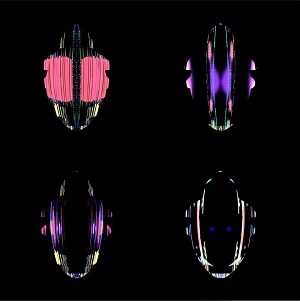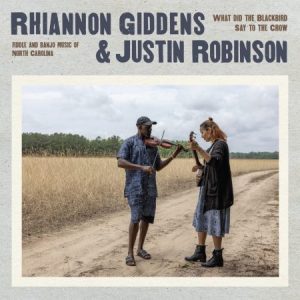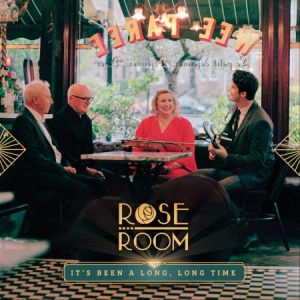Album review overview: Rose Room, Medler Sextet and more
Dozens of new albums arrive at Maxazine’s editorial staff every week. There are way too many to listen to them all, let alone review them. It ensures that too many albums are left behind. And that’s a shame. That is why today we post an overview of albums that arrive at the editors in short reviews.
Thaba – December/Sedimonthole
The release of Thaba’s “December/Sedimonthole”, the final album by South African singer Khusi Seremane and American producer Gabriel Cyr, ultimately became a sad affair due to Seremane’s passing. However, the album was still released as a tribute to Seremane. Wonderful, intimate downtempo sound from the band, combined with the new perspectives that Seremane and Cyr made their own, this time linked to South African music culture. The name of the record, ‘Sedimonthole’, is Tswana for December. It’s the month of the year when Seremane’s family visits the family home, the thusho. “December/Sedimonthole” is an album where multiple genres find a place, from the maskanda and mbaqanga guitar in “Bullets (Work & Deliver)”, featuring Brazilian percussionist Mauro Refosco, to the cosmic jazz of the album’s highlight “The Avarian”. The title track, “December”, the last song on the album that Seremane and Cyr wrote together, contains an enormous mountain of heartbreak. With Seremane’s vocals and the contributions of musicians like Nyasha Chiundiza and Billy Monama, “Sedimonthole” is also musically a rich and soulful journey. “December/Sedimonthole” is not only an ode to Seremane but also an honest and introspective quest for grief and healing. (William Brown) (7/10) (Self-produced)
Medler Sextet – River Paths
We encounter American multi-instrumentalist Michelle Medler in many guises. She plays in various ensembles across just as many different genres, from salsa to the swing jazz of the twenties of the previous century. In her own Medler Sextet, bop is predominant, of which this “River Paths” is the most recent result with six totally – indeed – different compositions. Though the word ‘scene’ might be more appropriate, as Medler’s music is almost cinematic. Each piece creates a unique atmosphere, with its own dynamics. From the languid “Smoldering” to the funk of the Fender Rhodes and the soul of the trumpet on an irrepressible rhythm in “Philly Soul Strut”. On “River Paths”, Medler proves to be not only a good composer but also an excellent arranger. Naturally, the lead role is for her saxophone, but everything is in balance with the parts for trombone, trumpet, and piano. Composer, arranger, and producer, as she also handled the production herself, with help from Dennis Carter, who, besides being a drummer, is also the founder of two renowned studios beloved by jazz musicians. The production deserves special mention, especially thanks to the two tracks that open and close the album. In opener “Subway Jam (Morning)” and closer “Subway Jam (Evening)”, we crawl like ants through the tunnels of a metro station where, in a corner between two platforms, a jazz band is playing. We slowly come closer, the music gets louder, clearer. Then we see the musicians, face to face. They play and we stay standing. We listen, let ourselves be carried away like a river meandering through the landscape, with a different view each time. We’ll catch the next train. (Jeroen Mulder) (8/10) (OA2 Records)
Kasiva Mutua – Desturi
Kasiva Mutua, percussionist from Kenya, recently released her debut album “Desturi”. Originally trained by her grandmother in traditional rhythms, Mutua has made a name for herself as a drummer in a culture where this is not self-evident for women. The album, of which “Twende Mbele” is the second single, contains 11 tracks combining pop music with percussion elements. The production is polished, but the song material lacks the power to truly resonate. The music positions itself between different styles, without developing a clear identity of its own. Although competently executed, it lacks memorable moments that would distinguish the album from the extensive offerings on the world music market. “Desturi” showcases Mutua’s technical skills, but as an artistic whole, it remains in the middle segment – not bad, but not particularly impressive either. It’s an album that will probably find a stage mainly at festivals, but will have little lasting impact. (Jan Vranken) (6/10) (Delicious Tunes)
Rhiannon Giddens & Justin Robinson – What Did the Blackbird Say to the Crow
Fiddle and banjo music from North Carolina. Rhiannon Giddens and Justin Robinson take us to the porches and living rooms of North Carolina with their latest album, “What Did the Blackbird Say to the Crow”. This collection of 18 traditional songs feels authentic and sincere, as if you’re sitting right next to the musicians during a spontaneous jam session. The recordings, made in the homes of their mentors Joe Thompson and Etta Baker, capture not only the music but also the natural environment – raindrops, cicadas, and birdsong form a natural background choir that enriches the listening experience. Robinson’s fiery violin playing and Giddens’ masterful banjo together create a timeless atmosphere. Songs like “Rain Crow” and “John Henry” showcase their vocal harmony, while instrumental pieces such as “Brown’s Dream” demonstrate their technical prowess. In a time when polished productions are the norm, it’s brave and refreshing to make music that stays so close to its roots. This album deserves an 8/10 precisely because of this authenticity and the courage to present tradition in its purest form. An essential acquisition for lovers of old-time string music and folk. (Jan Vranken) (8/10) (Nonesuch Records)
Rose Room – It’s Been a Long, Long Time
The interbellum between the two all-destroying wars on the continent was a time with contradictory faces. The continent was under high political tension due to the rise of fascism, but little of this was noticeable in many Parisian clubs. There, a Belgian musician made a sensation with a new style of music, where the rhythm was indicated with short strokes on a guitar. Django Reinhardt thus became the founder of jazz manouche; gypsy jazz, also known as swing. It’s the genre in which the Scottish Rose Room has been very successful for fifteen years. On this “It’s Been a Long, Long Time” they revive the times of the Parisian Hot Club Swing. Now, jazz manouche is also a dangerous genre: not rarely do these kinds of records become a sort of parody of Reinhardt’s work or that of his contemporaries, due to poor arrangements or because pieces were executed too sloppily. And good swing stands or falls by its extremely tight execution. Every detail counts. Rose Room from Glasgow has understood this well: the musicality of this ensemble is beyond question. But more important than the excellent arrangements and perfect execution is the passion that especially resonates in the vocals of Seonaid Aitken. Listen to “I wish You Love” or “I Found a New Baby”: two tracks carried by Aitken’s voice, and in which Rose Room proves that you can bring jazz manouche in your style. And it is precisely for this reason that this is a more beautiful tribute to the founder of this genre than many shameless copies. (Jeroen Mulder) (8/10) (Rose Room)










